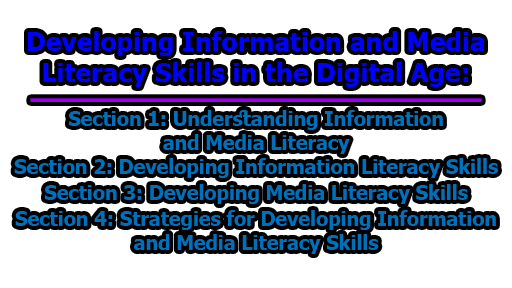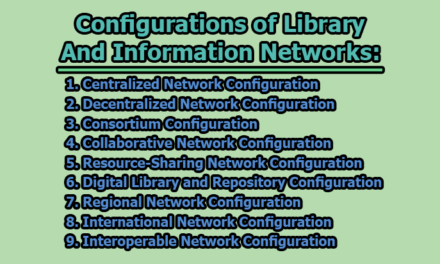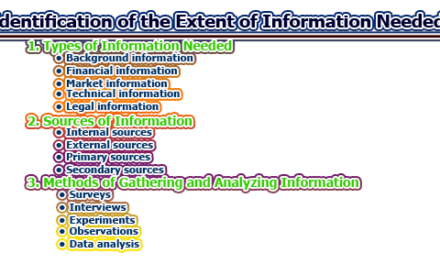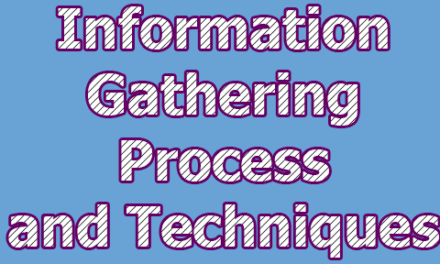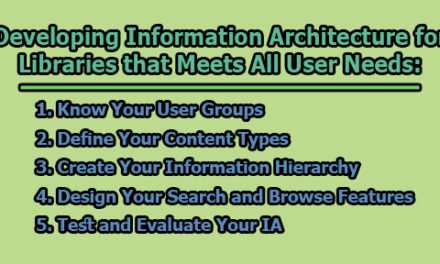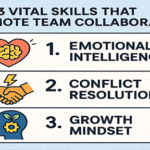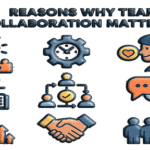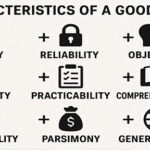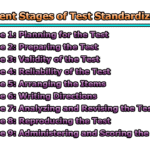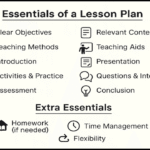Developing Information and Media Literacy Skills in the Digital Age:
In today’s digital age, information and media are omnipresent, influencing every aspect of our lives. From news articles and social media posts to online advertisements and video content, we are constantly bombarded with vast amounts of information. However, not all information is reliable, accurate, or unbiased. This makes it crucial for individuals to develop strong information and media literacy skills to navigate the digital landscape effectively. In this article, we will delve into the importance of information and media literacy and provide practical strategies to develop these skills.
Section 1: Understanding Information and Media Literacy
1.1 Defining Information and Media Literacy
- Explanation of information literacy: The ability to access, evaluate, and use information effectively.
- Explanation of media literacy: The ability to analyze, evaluate, and create media messages across various platforms.
1.2 Importance of Information and Media Literacy
- Navigating the digital age: Understanding the overwhelming amount of information available.
- Critical thinking: Developing the ability to question and analyze information critically.
- Empowerment and active citizenship: Making informed decisions and participating in democratic societies.
- Protection against misinformation: Identifying and avoiding false or misleading information.
Section 2: Developing Information Literacy Skills
2.1 Accessing Information Effectively
- Utilizing search engines and databases: Tips for conducting efficient and targeted searches.
- Evaluating sources: Assessing the credibility, authority, and currency of information.
- Utilizing academic resources: Exploring scholarly journals, research databases, and libraries.
2.2 Evaluating Information Reliability
- Recognizing bias: Identifying potential biases and understanding their impact on information.
- Fact-checking and verification: Utilizing fact-checking websites and tools to verify information.
- Identifying trustworthy sources: Recognizing reputable publications, authors, and organizations.
2.3 Analyzing Information
- Understanding different types of information: Differentiating between primary, secondary, and tertiary sources.
- Identifying logical fallacies: Recognizing common errors in reasoning and argumentation.
- Assessing data and statistics: Analyzing numerical data to draw accurate conclusions.
2.4 Using Information Ethically
- Understanding copyright and fair use: Respecting intellectual property rights and citing sources appropriately.
- Avoiding plagiarism: Recognizing the importance of originality and proper attribution.
- Ethical use of digital content: Respecting privacy, consent, and online community guidelines.
Section 3: Developing Media Literacy Skills
3.1 Analyzing Media Messages
- Deconstructing media texts: Identifying underlying messages, perspectives, and purposes.
- Recognizing media techniques: Understanding visual and audio techniques used to convey messages.
- Detecting propaganda and manipulation: Identifying techniques employed to influence opinions.
3.2 Evaluating Media Credibility
- Assessing sources and authors: Verifying the expertise and credentials of media producers.
- Recognizing biased reporting: Identifying sensationalism, agenda-driven narratives, and clickbait.
- Cross-referencing information: Comparing multiple sources to gain a comprehensive understanding.
3.3 Understanding Media Influence
- Effects of media on individuals and society: Exploring the impact of media on beliefs, attitudes, and behaviors.
- Media literacy and advertising: Analyzing persuasive techniques used in marketing and advertising.
- Media literacy and digital citizenship: Promoting responsible online behavior and combating cyberbullying.
3.4 Creating Media Responsibly
- Media production tools: Introduction to digital tools for creating and editing media content.
- Copyright and intellectual property: Respecting the rights of others when creating and sharing media.
- Digital citizenship and online safety: Encouraging ethical behavior and responsible online interactions.
Section 4: Strategies for Developing Information and Media Literacy Skills
4.1 Formal Education and Curriculum Integration
- The role of educational institutions: Incorporating information and media literacy into school curricula.
- Teaching methodologies: Effective strategies for educators to promote information and media literacy.
4.2 Self-Directed Learning and Online Resources
- Online courses and tutorials: Accessing free or low-cost courses to develop information and media literacy skills.
- Educational websites and platforms: Exploring reputable websites offering reliable information and resources.
- Fact-checking organizations: Utilizing fact-checking organizations to verify information.
4.3 Critical Thinking and Skepticism
- Cultivating critical thinking skills: Encouraging questioning, analysis, and independent thought.
- Avoiding confirmation bias: Challenging preconceived notions and seeking diverse perspectives.
- Practicing skepticism: Questioning sources, claims, and motives before accepting information.
4.4 Collaborative Learning and Peer Engagement
- Group discussions and debates: Engaging in constructive conversations to evaluate information and media.
- Peer review and feedback: Seeking feedback from peers to enhance critical thinking and evaluation skills.
- Participating in online communities: Joining forums and communities focused on media literacy and information verification.
In conclusion, we can say that developing information and media literacy skills is crucial for individuals to navigate the digital landscape effectively. By mastering these skills, individuals can access reliable information, critically analyze media messages, and make informed decisions. This guide has provided a comprehensive exploration of information and media literacy, offering practical strategies for developing these skills. By embracing information and media literacy, individuals can become discerning consumers and active participants in the digital age, contributing to a more informed and engaged society.
FAQs:
What is information literacy?
Information literacy refers to the ability to access, evaluate, and effectively use information. It involves skills such as locating and accessing information, critically evaluating its credibility and reliability, and using it ethically and responsibly. Information literacy is essential in the digital age, where vast amounts of information are readily available but not all of it is trustworthy or accurate.
Why is information literacy important in the digital age?
Information literacy is crucial in the digital age for several reasons:
- Navigating the overwhelming amount of information: The internet provides a vast array of information, but not all of it is reliable. Information literacy skills help individuals filter through the abundance of information to find accurate and credible sources.
- Critical thinking and analysis: Information literacy promotes critical thinking skills, enabling individuals to question and evaluate information, identify biases, and make informed judgments.
- Empowerment and active citizenship: Information literacy empowers individuals to participate actively in democratic societies, make informed decisions, and engage in civic discourse.
- Protection against misinformation: With the rise of fake news and misinformation, information literacy equips individuals with the tools to recognize and avoid false or misleading information.
What is media literacy?
Media literacy is the ability to critically analyze, evaluate, and create media messages. It involves understanding how media messages are constructed, recognizing biases and manipulations, and being able to interpret and respond to media content effectively. Media literacy is essential in today’s digital landscape, where media messages are pervasive across various platforms.
How does media literacy differ from information literacy?
While information literacy focuses on accessing, evaluating, and using information effectively, media literacy specifically addresses the analysis, evaluation, and creation of media messages. Media literacy goes beyond information literacy by considering the unique characteristics of media texts, such as visual and audio elements, storytelling techniques, and persuasive strategies. Both literacy skills are essential in the digital age and complement each other in enabling individuals to navigate and engage with media effectively.
How can I develop information literacy skills?
To develop information literacy skills, consider the following strategies:
- Utilize search engines and databases effectively to locate relevant information.
- Evaluate the credibility and reliability of sources by considering factors such as author expertise, publication date, and source reputation.
- Analyze information critically by assessing its relevance, accuracy, and potential biases.
- Understand and apply ethical guidelines for using information, including proper citation and avoiding plagiarism.
- Stay updated on digital tools and resources that can enhance your information literacy skills.
What steps can I take to improve my media literacy skills?
To enhance your media literacy skills, try the following:
- Analyze media messages by deconstructing them to identify underlying messages, techniques, and purposes.
- Evaluate the credibility of media sources by considering the reputation, bias, and agenda of the producers.
- Engage in cross-referencing by comparing information from different sources to gain a more comprehensive understanding.
- Be aware of the potential influence of media on beliefs, attitudes, and behaviors.
- Create media responsibly by considering ethical guidelines, respecting copyright, and promoting digital citizenship.
Are there resources available to help develop information and media literacy skills?
Yes, there are numerous resources available to develop information and media literacy skills. These include online courses, tutorials, educational websites, fact-checking organizations, and library resources. Organizations such as the American Library Association, UNESCO, and the National Association for Media Literacy Education provide valuable resources and guidelines for developing these skills. Additionally, academic databases, digital libraries, and online communities focused on information and media literacy can provide access to relevant materials and opportunities for learning and collaboration.
How can information and media literacy skills benefit me in everyday life?
Developing information and media literacy skills can benefit you in various ways:
- Making well-informed decisions: You can critically evaluate information, separate fact from fiction, and make informed choices in various areas of life, such as health, finance, and politics.
- Engaging in critical thinking: These skills enable you to analyze arguments, detect biases, and approach information with a discerning mindset.
- Protecting yourself from misinformation: By developing information and media literacy skills, you can identify and avoid false or misleading information, reducing the risk of being misled or deceived.
- Participating in democratic processes: With strong information and media literacy skills, you can actively engage in democratic processes, express your opinions, and contribute to informed discussions and decision-making.
Remember, developing information and media literacy skills is an ongoing process that requires practice, critical thinking, and a willingness to engage with diverse sources and perspectives. By investing in these skills, you can become a more discerning consumer and an active participant in the digital age.
References:
- American Library Association. (2017). Information Literacy Competency Standards for Higher Education.
- Hobbs, R. (2011). Digital and Media Literacy: Connecting Culture and Classroom. Corwin Press.
- International Federation of Library Associations and Institutions (IFLA). (2019). IFLA Information Literacy Section.
- Jenkins, H., Clinton, K., Purushotma, R., Robison, A. J., & Weigel, M. (2009). Confronting the Challenges of Participatory Culture: Media Education for the 21st Century. The MIT Press.
- (2013). Media and Information Literacy Curriculum for Teachers.

Assistant Teacher at Zinzira Pir Mohammad Pilot School and College

